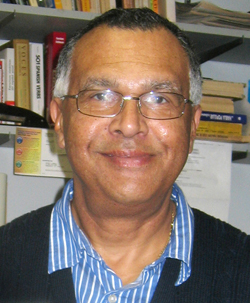Fidel's Resignation Won't Mean Much--Rafael Saumell-Muñoz
 |
Rafael Saumell-Muñoz |
As long as Fidel Castro is alive and "lucid," his
resignation as Cuban president doesn't mean much.
This is according to Rafael Saumell-Muñoz, professor
of foreign languages at Sam Houston State University. Saumell-Muñoz
was born in Cuba and was imprisoned there in what now seems
a lifetime ago.
Over the years Saumell-Muñoz has been sought for his
perspective on his homeland. Most recently he was quoted in
an article in the newspaper Pravda in Slovakia.
"Castro's resignation is good news but not yet the best
news," said Saumell-Muñoz. "He hasn't resigned
yet as secretary general of the Communist Party, and that is
where his real power lies."
Saumell-Muñoz compared the situation in Cuba now to
that in China 20 years ago and that in Russia under Gorbachev.
"He will remain as the moral authority acting as a supremely
strong 'consigliere' (adviser) whose opinions will be sought,
respected and obeyed," Saumell-Muñoz said of Castro.
"As long as he stays lucid the new rulers will check
with him before making any strategic decision."
Saumell-Muñoz does have some hope for his native land.
"His brother Raúl might introduce some economic
changes that will probably help the agricultural sector,"
he said. "Also, he may allow the creation of small and
private businesses (food supply, restaurants, mechanic shops,
house repairing companies, etc.). That will never pose any danger
to the government's absolute control over the main sources of
getting high currency--tourism, the sugar industry, nickel extraction
and exportation, the tobacco industry, etc.)."
"Raúl will keep total control over the media, plus
the educational, health and sports sectors," said Saumell-Muñoz.
"He might be more tolerant toward dissident organizations
but will treat them as 'informal groups' such as Gorbachev did
during the first years of 'glasnost' and 'perestroika.'"
The change could also signal some small movement in the governing
philosophy, Saumell-Muñoz believes.
"Some key government players will be relatively new to
the rest of the world, they will look less dogmatic, but at
the end they will try to save the regime, making a slight
shift perhaps from a totalitarian state to an authoritarian
one."
Saumell-Muñoz was an award-winning TV writer and producer
while living in Cuba in the 70s. He was imprisoned there after
a “so-called friend” whom Saumell-Muñoz
later found out was a secret police informant, told the police
about Saumell-Muñoz’s “politically incorrect”
collection of short stories.
“The police arrested me and asked two so-called readers
of the Union of Writers and Artists of Cuba to make a political
evaluation of the book,” he said. “These two readers
came to the conclusion that my book was counterrevolutionary.”
With his book labeled “enemy propaganda” by the
Cuban penal code, Saumell-Muñoz was sentenced to five
years in prison.
“I knew that it was a criticism of the present situation
of Cuba at the time, but it would never cross my mind that
it would be considered enemy propaganda for two reasons: in
order to consider something propaganda, it has to be public,
but if a book has not been published, how can you call it
public?” he said.
“If you label something enemy propaganda, that document
must be paid for by a foreign government who wants to use
the document to attack another government. Obviously I wasn’t
paid by anyone; I was just moved by my consciousness."
Saumell-Muñoz as well as other Cuba expatriates continues
to hope for and work toward a more democratic form of government
for the country that they still love so dearly.
“They control the police, they control the courts, they
control the prison system. So any time you have political
trouble in Cuba, this is a lost battle,” Saumell-Muñoz
said. “They will do to you whatever they want.”
He does not expect that to change greatly, even with Castro
no longer serving as president.
When Saumell-Muñoz was released from prison in 1986,
he applied for an American visa, which was granted in 1988,
and eventually became a graduate student at Washington University
in St. Louis, Mo., where he completed his doctorate.
He came to SHSU in 1992.
—END—
SHSU Media Contact: Frank
Krystyniak, Jennifer
Gauntt
Feb. 22, 2008
Please send comments, corrections, news tips to Today@Sam.edu.
|








